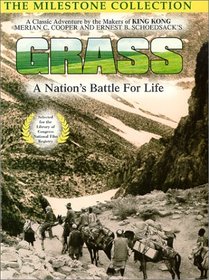| Actors: Marguerite Harrison, Haidar Khan, Lufta, Ernest B. Schoedsack Director: Ernest B. Schoedsack Genres: Classics, Educational, Documentary Sub-Genres: Silent Films, Educational, History Studio: Image Entertainment Format: DVD - Black and White DVD Release Date: 03/28/2000 Original Release Date: 01/01/2025 Theatrical Release Date: 01/01/2025 Release Year: 2000 Run Time: 1hr 11min Screens: Black and White Number of Discs: 1 SwapaDVD Credits: 1 Total Copies: 0 Members Wishing: 3 MPAA Rating: NR (Not Rated) Languages: English |
Search - Grass: A Nation's Battle For Life on DVD
  | Grass A Nation's Battle For Life Actors: Marguerite Harrison, Haidar Khan, Lufta, Ernest B. Schoedsack Director: Ernest B. Schoedsack Genres: Classics, Educational, Documentary NR 2000 1hr 11min A classic adventure by the makers of "King Kong." In 1924, neophyte filmmakers Merian C. Cooper and Ernest B. Schoedsack hooked up with journalist and sometime spy Marguerite Harrison and set off to film an adventure. They... more » |
Larger Image |
Movie DetailsSimilar Movies
Similarly Requested DVDs
|
Movie ReviewsThe most amazing film I've ever seen James Hassett | Arlington, MA United States | 12/06/2003 (5 out of 5 stars) "This 1925 silent film documentary is not for everybody. The first half is irrelevant and slow, and the commentary is hokey. I was surprised there were no dramatic Hollywood scenes of people falling off cliffs. But what I got instead was a historical record of 50,000 people and 500,000 animals walking for 48 days across Persia to avoid famine. It's hard to believe that these are real people, genuinely swimming for their lives, crossing a half-mile of freezing rapids holding on to blown up goat skins. We are so used to seeing things staged, that it's hard to accept that they really are climbing that 12,000 foot mountain in their bare feet, to get a better grip in the ice and snow." Amazing and Horrific PeerGynt | S. Utah | 06/02/2002 (5 out of 5 stars) "Though the movie does not dwell excessively on the pain of the 50,000 people who twice anually must trek for 48 days in order to survive, the horrors of such a journey cannot be ignored. The movie is a beautiful account of the lives of humans in the harshest of conditions." Life Lessons 101 James Thompson | Elizabeth City,North Carolina | 05/30/2000 (5 out of 5 stars) "Great Film! Story is untouched by Hollywood flair and fantasy because you just can't make this stuff up.There came a point in the film when I realized I had taken for granted that this was just a movie. Then I realized that their very survival rested on each and every step they took forward. If you think your life is stressful and unrewarding this movie will inspire you. Riveting!" A remarkable document, with message aimed at contemporaries Nathan Andersen | Florida | 05/27/2005 (5 out of 5 stars) "This remarkable film easily fits on the same shelf with the finest early documentaries, such as Nanook of the North, Silent Enemy and Man of Aran, whose aim was to capture on film ways of life that were in the process of passing away and now no longer exist. What sets this one apart from the others is that in this film there was a real effort to achieve authenticity and not to create a false (even if "true in spirit") narrative as a backdrop for the plot. In all of the other films mentioned there was a fairly substantial artificiality to the story that was used to retain interest in the material (i.e. they show natives engaging in activities that they no longer engage in, or that they rarely engage in; they set up little dramas; this is something that Schoedsack and Cooper found they needed to do for the success of their next film: Chang; but here they tried to be more naturalistic). In this case, there are two narratives that undergird the document: the story of Schoedsack and Cooper themselves (who remain for the most part in the background) and of the woman who accompanied them (Marguerite Harison); the second is the story of the tribal leader and his young son who will someday take the mantel of the father and lead the villagers along the same journey. While there is some staging of these "stories," it is less complex than in the other films and retains a ring of authenticity -- the boy really will have to become a leader and the crew really did make it across (it is also interesting to note that they include a mark of the authenticity of their journey in the film by filming a signed affidavit from a local authority that they had in fact completed the trek). The real "heroes" of the story, whose actions could not be faked, were the tribe as a whole who had to walk barefoot over snowy mountains to bring their animals to pasture.
In addition to a compelling portrait of a passing way of life, which is full of poignant and witty intertitles and small moments that humanize the massive scope of the operation, the film has a subtext which is to remind American audiences that they have "gone soft" -- that they have lost the hardiness of their pioneer ancestors and that these living people retain it. This is a message that Schoedsack and Cooper remind us of in their subsequent fictional masterpiece: King Kong." |














